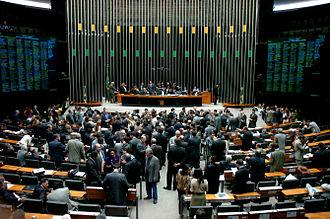Brazil’s government has stepped up its opposition to Congress’s recent decision to roll back a proposed tax increase, intensifying a political standoff over fiscal policy. The move, which threatens to undermine efforts to address the country’s budget deficit, has escalated tensions between the executive branch and lawmakers, highlighting deep divisions in Brazil’s approach to economic reform. As both sides dig in, uncertainty looms over the government’s ability to implement critical financial measures amid mounting public pressure and economic challenges.
Brazil Government Condemns Congress Move to Revoke Tax Increase Amid Fiscal Strain
The Brazilian government’s firm stance against Congress’ decision to overturn the recent tax increase marks a significant escalation in the ongoing fiscal debate. Officials warn that revoking the tax hike jeopardizes vital revenue streams needed to fund public services and social programs amid the country’s persistent economic challenges. The Treasury Ministry expressed concern that without the additional tax measures in place, Brazil may face a widening budget deficit, further complicating efforts to stabilize public finances.
Key points highlighted by the government include:
- Projected shortfall in annual tax revenue exceeding BRL 15 billion
- Potential cuts in healthcare and education budgets
- Increased risk of credit rating downgrades affecting investment inflows
- Urgent need for fiscal discipline to maintain economic recovery momentum
| Fiscal Indicator | Pre-Tax Increase | Post-Tax Increase | After Reversal |
|---|---|---|---|
| Annual Revenue (BRL Billion) | 1,200 | 1,215 | 1,200 |
| Budget Deficit (%) | 7.0% | 6.0% | 7.5% |
| Credit Rating | BB+ | BB+ | BB |
Experts Warn of Economic Risks as Political Deadlock Deepens in BrasÃlia
Economic analysts are raising alarms about the mounting fiscal uncertainty as conflicts escalate between the executive branch and Congress over recent legislative reversals. The government’s attempt to enforce a controversial tax hike, which was subsequently overturned by lawmakers, has triggered heightened concerns over investment confidence and budgetary projections. Market volatility has surged, reflecting investor anxiety about Brazil’s ability to navigate through sustained political gridlock.
The deadlock threatens to undermine critical reforms needed for economic recovery, with experts emphasizing several key risks:
- Credit rating pressures: Downgrades may follow if fiscal discipline weakens, increasing borrowing costs.
- Delayed policy implementation: Key infrastructure and social programs are at risk of stalled funding.
- Capital flight: Investors may seek safer markets amid uncertainty.
| Economic Indicator | Pre-Tax Hike | Current Projection |
|---|---|---|
| GDP Growth | 2.4% | 1.3% |
| Inflation Rate | 4.1% | 5.5% |
| Foreign Investment | Stable | Declining |
Policy Analysts Recommend Dialogue and Fiscal Reforms to Resolve Legislative Impasse
Amid escalating tensions between the Brazilian government and Congress, policy analysts are urging a renewed commitment to dialogue coupled with comprehensive fiscal reforms to break the ongoing deadlock. Experts emphasize that without transparent communication channels and targeted legislative adjustments, the political impasse risks deepening economic uncertainty and undermining investor confidence. Several analysts pointed to the need for aligning fiscal policies with macroeconomic priorities to ensure sustainable growth while addressing public expenditure concerns.
Key recommendations from policy experts include:
- Initiating bipartisan talks to foster consensus on tax policies and budgetary allocations
- Implementing gradual fiscal reforms to reduce public debt and improve revenue collection
- Enhancing transparency in the legislative process to rebuild trust among stakeholders
| Fiscal Challenge | Proposed Reform | Expected Outcome |
|---|---|---|
| High public debt | Debt ceiling adjustments | Stabilized debt-to-GDP ratio |
| Tax system complexity | Simplification of tax codes | Improved compliance and collection |
| Budget deficits | Spending review and cuts | Balanced public finance |
Concluding Remarks
As the dispute between Brazil’s executive branch and Congress intensifies over the tax hike reversal, the unfolding political stalemate threatens to complicate the government’s fiscal agenda amid an already fragile economic landscape. Stakeholders across the spectrum will be closely monitoring developments, with potential implications for Brazil’s policy stability and investor confidence in the months ahead.




